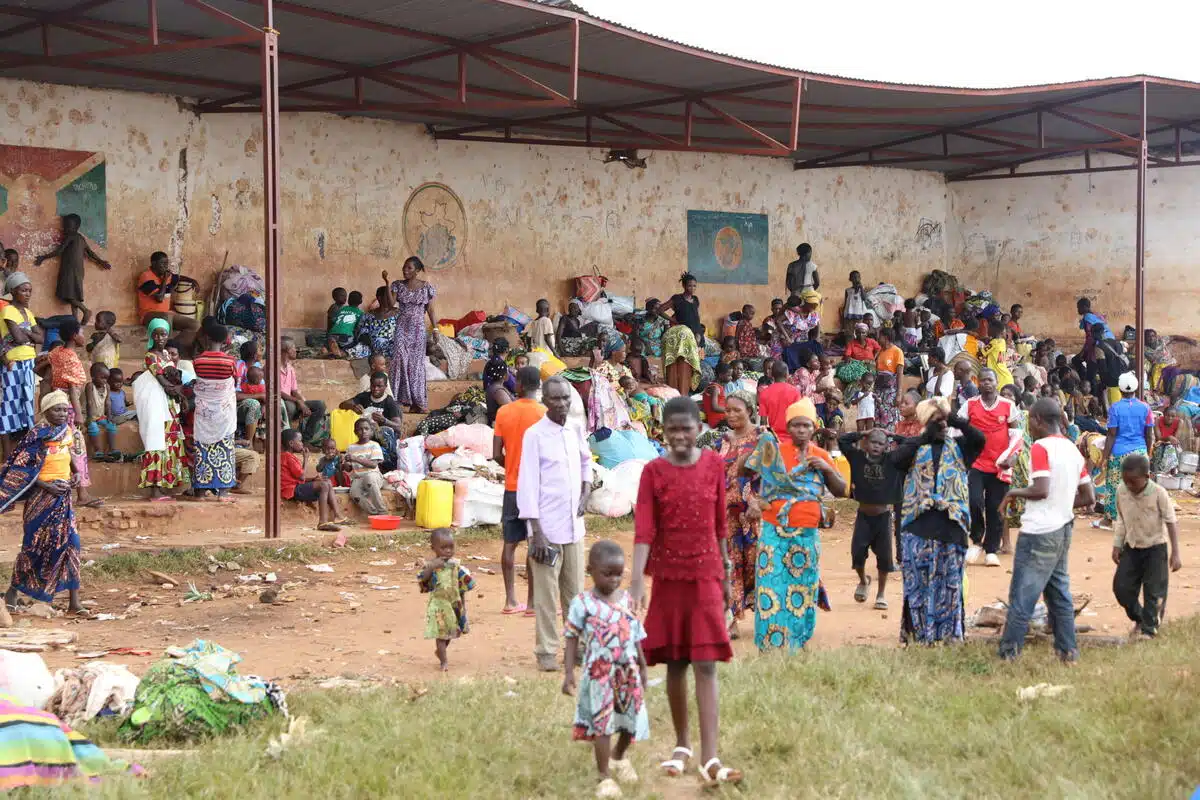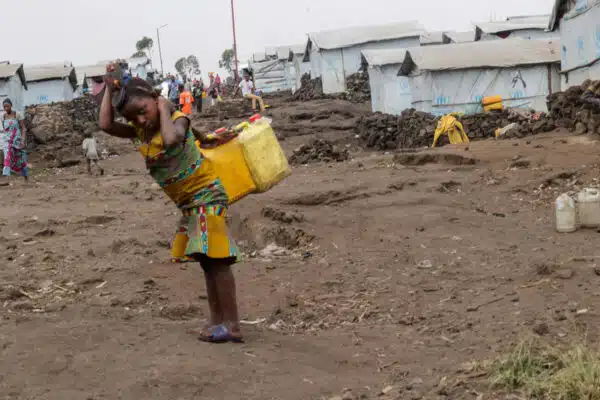
Families fleeing the violence in the Democratic Republic of the Congo shelter at a school in northwestern Burundi’s Cibitoke Province. © UNHCR/Bernard Ntwari
This is a summary of what was said by Brigitte Mukanga-Eno, UNHCR Representative in Burundi– to whom quoted text may be attributed – at today’s press briefing at the Palais des Nations in Geneva.
As fighting continues in the east of the Democratic Republic of the Congo (DRC), the humanitarian situation is fast deteriorating in neighbouring Burundi, with daily arrivals increasing through its northwestern border and people taking greater risks to reach safety, using makeshift boats to cross the Rusizi river.
On Wednesday alone, more than 9,000 people arrived fleeing what they described as an increasingly dire situation across the border. Since February, over 40,000 Congolese nationals – the majority women and children – have arrived in Burundi seeking international protection. This number is likely to increase as hostilities in the DRC advance towards the town of Uvira, close to the main official border crossing with Burundi.
UNHCR, the UN Refugee Agency, welcomes the Government of Burundi’s decision to grant prima facie refugee status to those fleeing the conflict in the DRC, ensuring their swift access to protection and critical humanitarian assistance.
Those arriving are mainly Congolese who were already internally displaced by previous conflicts, now forced to move once again by renewed clashes. Some are arriving from as far as Goma, hundreds of kilometres to the north – another devastating example of repeated displacement in the East Africa region.
UNHCR teams on the ground note a worryingly high number of children among the new arrivals, many of them unaccompanied or separated from their families while fleeing. Refugees describe fleeing intense clashes and gunfire. Many said they did not have enough food to survive and were unable to continue working their land.
The vast majority continue to arrive via unofficial crossing points, many traversing the Rusizi river into the Rugombo and Buganda Communes in Cibitoke Province. Many families remain without shelter in the open, exposed to the elements under heavy seasonal rains. Others are sheltering in schools, transit centres and a stadium with limited services.
There is an urgent need for shelter, food and latrines as well as relocation of the new arrivals to other sites to address overcrowding.
Several cases of measles have been confirmed, with a real risk of the disease spreading given the growing numbers in the area. In Rugombo, vaccinations are ongoing to curb the further spread of the disease.
UNHCR and partners are stepping up assistance, distributing warm meals and water to new arrivals. Relief items such as sleeping materials, buckets and soap are also being distributed. Community organizations are providing exceptional support to refugees.
Working with national authorities, refugees will be transferred in the next few days to the Musenyi refugee site in the southeast of the country, which has a capacity for 10,000 people. The Government also plans to allocate land to set up additional sites.
Movements elsewhere in the region have been smaller, with around 15,000 new arrivals registered in other neighbouring countries since January. In Uganda, more than 13,000 people from the DRC, including from Goma, have arrived since January, mainly through the Nyakabande transit centre. In Rwanda, there is so far no indication of a notable increase in arrivals who have opted to stay and seek asylum, as most have already returned to DRC. On 19 February, 53 Congolese nationals sought refuge in Kigoma, Tanzania, the highest number in a day since the start of the year.
To respond to this worsening emergency, UNHCR is seeking $40.4 million to strengthen preparedness and deliver life-saving protection and assistance to 275,000 internally displaced people in South Kivu, North Kivu, Maniema and Tanganyika provinces of the DRC, as well as to support a potential influx of 258,000 refugees, asylum-seekers, and returnees in neighbouring countries, including Burundi, Rwanda, Tanzania, Uganda and Zambia.
UNHCR calls on the international community to support the efforts initiated by the national authorities and humanitarian partners. Needs are outpacing resources. Without an urgent injection of funds, we risk a further deterioration as the crisis intensifies.
For more information, please contact:
- In Bujumbura: Bernard Ntwari, ntwarib@unhcr.org, +257 69 91 80 00
- In Kinshasa: Hanson Tamfu, tamfu@unhcr.org, +243 825 257 774
- In Nairobi (regional): Faith Kasina, kasina@unhcr.org, +254 113 427 094
- In Pretoria (regional): Duniya Aslam Khan, khand@unhcr.org, +27 84 585 720
- In Geneva: Olga Sarrado Mur, sarrado@unhcr.org, +41797402307
- In Geneva: Eujin Byun, byun@unhcr.org, +41 79 747 8719
Originally published by UNHCR on 21 February 2025





